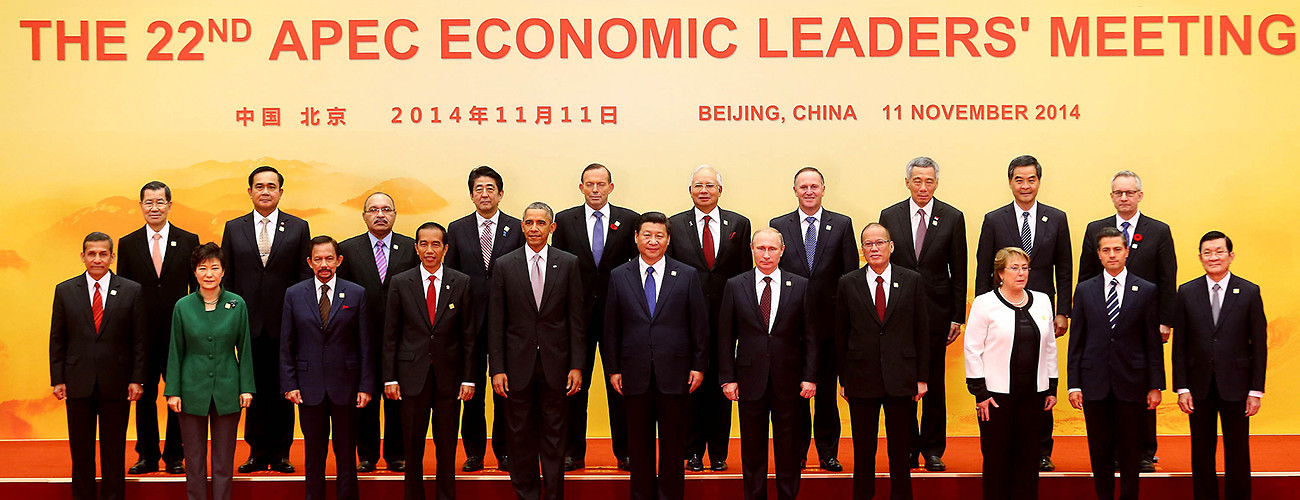Participants of the 22nd APEC Economic Leaders' Meeting in Beijing, capital of China, Nov. 11, 2014. (Xinhua/Yao Dawei)
It began with the meeting in March between the foreign ministers of China, Japan, and South Korea—the first in three years. Now there is speculation that Japanese Prime Minister Shinzō Abe and Chinese President Xi Jinping might speak on the sidelines of this week’s Asia-African Summit in Indonesia. Given the troubled recent relations in East Asia, simple conversations that would be considered insignificant in other contexts have taken on great weight. The hope is that they might presage the establishment of increased regional diplomacy, which could help to head off the significant threat of future conflict.
If the talked-of meeting between Abe and Xi proceeds, it would build on the first contact between the leaders in November last year, which was marked by Xi’s silent reaction to Abe’s greeting and what has been described as the “world’s most awkward head of state handshake.” The strained public encounter was, however, followed by backroom discussions that offered signs of progress on resolving East Asia’s considerable regional disagreements, many of which spring from China’s expanding power and regional ambitions, and disputes over Japan’s militarism in the first half of the 20th century.
The Indonesian conference would provide an ideal setting for talks, with all attendees necessarily needing to spend significant time dwelling on the increasing global prominence of China, due to the fact that investment out of Beijing is helping fuel many of the burgeoning economies of Asia and Africa. The specter of history will also be ever present, with the event commemorating 60 years since the landmark Bandung Conference, which helped set the future direction of the mainly post-colonial and post-conflict countries in attendance.
Talks of any nature and duration between Abe and Xi could lead to a thawing of relations between Japan and China at a time when events on the ground seem to point in the opposite direction. In recent weeks Japan has criticized China’s new Asian Infrastructure Investment Bank, which it considers a rival to the Asian Development Bank it helps to lead, and the World Bank dominated by its ally the United States. China’s maritime activities, such as its increasingly expansive land reclamation process in the South China Sea, have also increased fears in Asia and beyond that it is edging closer to obtaining the regional military and resource dominance long predicted. Japan has in turn risked angering China by discussing the possibility of joint patrols and surveillance with the US in that same body of water.
Despite how serious the implications of China’s disputes with Japan—or any other nation—could be, most East Asian conflict in the past few decades has involved clashes of words rather than tanks or warships. So far, those battles exist more in the theories and calculations of politicians and academics, among others. There is, therefore, a reason to believe that increasing dialogue between China, Japan, the US, and other invested countries could still be fruitful in creating an environment for peace.
Last month’s meeting of foreign policy ministers was promising in this respect, with the parties agreeing to the restoration of a “trilateral cooperation mechanism” and offering support for South Korean President Park Geun-hye’s Northeast Asia Peace and Cooperation Initiative (NAPCI), whose establishment suggests that the peninsula nation might be willing to act as a mediator in regional disputes, even if it has many significant grievances of its own. Importantly, the NAPCI would further increase dialogue through its emphasis on building trust and multilateral cooperation.
With China increasingly monopolizing power in the region, its general policy of expansionism seems unlikely to be curbed any time soon, particularly if US forces remain preoccupied with considerations further afield. Beijing might, however, be convinced to tone down some of its contentious claims to territory. There is precedence for this in the case of Japan’s Ryuku Islands, which includes the heavily populated and US military-hosting Okinawa. Officials had begun to discuss China’s historical sovereignty over the chain in 2013, but soon walked away from this position once the scale of Japanese and US objection became apparent.
Further progress on building trust and increasing negotiations will, however, largely rely on whether Japan is able to end the debates over its military expeditions in China, Korea, and elsewhere in the lead-up to and throughout World War II. With this year marking the 70th anniversary of the end of that conflict, calls for the country to fully come to terms with its history have grown considerably louder.
An unabridged acknowledgment of acts such as the violent conquest of Nanking and the maintenance of the system of sex slaves known as “comfort women” will be necessary for further diplomatic outcomes to flow in the coming years. Abe will also need to ensure other politicians and members of the Japanese bureaucracy toe the same line. The major test will come on August 17th, the date of Japan’s formal surrender and the end of the war in Asia. Any meeting between Abe and Xi this week, or at some other point before the August anniversary, might suffer from lacking such acknowledgments. Alternatively, they could be used to smooth the path towards this definitive outcome.
Abe’s April travel plans also include a trip to the US, where he will become the first Japanese leader to address a joint session of Congress and hope to conclude protracted negotiations around the Trans-Pacific Partnership trade deal, which notably excludes China. While the circumstances around their relationship are vastly different, the manner in which the US and Japan have recovered from their wartime aggression, and now constitute firm economic, political, and military partners, offers considerable hope that the troubled histories involved in East Asian dealings might also be overcome.
James Bowen is the Assistant Editor of the Global Observatory.





